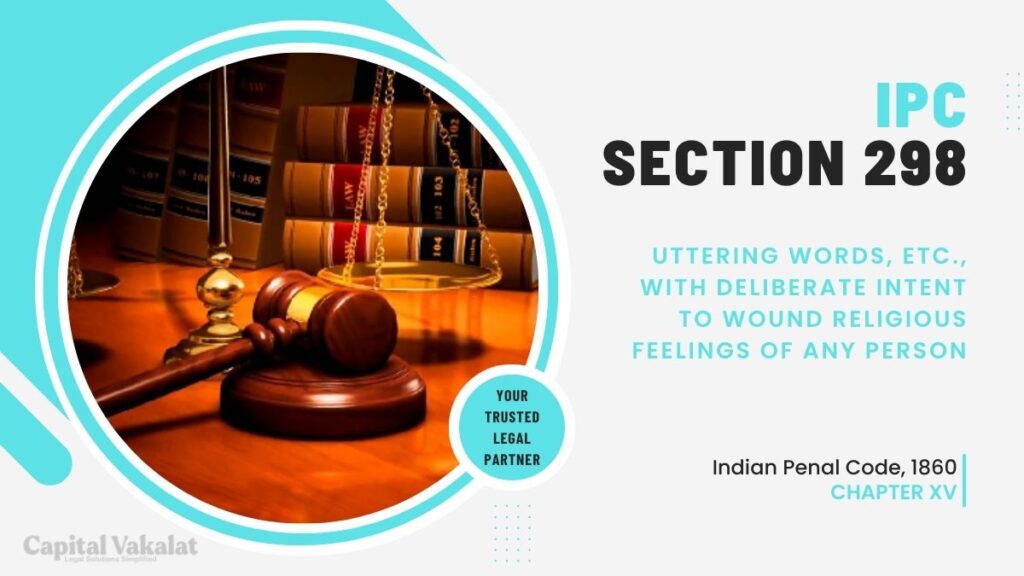In a society as diverse as India, the intersection of freedom of expression and religious sentiments is a delicate matter that often finds itself in the legal realm. Section 298 of the Indian Penal Code (IPC) addresses the act of uttering words with deliberate intent to wound religious feelings.

This article delves into the nuances of Section 298 IPC, its historical context, legal implications, controversies, and the broader societal impact.
Introduction
Understanding the legal intricacies of Section 298 IPC is crucial in navigating the complex terrain where freedom of speech meets the protection of religious sentiments. Enshrined in the IPC, this provision holds significance in maintaining communal harmony and preventing the misuse of language that can incite religious disharmony.
Historical Context
To comprehend the contemporary application of Section 298 IPC, a journey through its historical evolution is necessary. Originating from the colonial era, this section has undergone amendments to adapt to the evolving sociocultural landscape. Landmark legal cases have played a pivotal role in shaping the interpretation of this provision, setting precedents that influence its application today.
Understanding the Language of the Section
The language of Section 298 IPC requires careful scrutiny to comprehend its scope and implications. Breaking down the key elements, the provision addresses not only the act of uttering words but also emphasizes the crucial aspect of ‘deliberate intent.’ Analyzing this intent becomes paramount in legal proceedings related to Section 298 IPC.
Significance of Religious Feelings
Religious feelings, as contemplated in the section, hold immense importance in a country known for its diverse religious tapestry. This section recognizes the potential impact of words on individuals and communities, aiming to shield them from deliberate verbal attacks that could disrupt communal harmony.
Legal Consequences of Violating Section 298 IPC
Understanding the penalties outlined in Section 298 IPC is essential for anyone navigating the legal landscape. Real-life examples of cases where individuals faced legal actions under this provision serve as cautionary tales, illustrating the serious consequences of violating the sanctity of religious sentiments.
Criticisms and Controversies
The intersection of freedom of speech and religious sentiments often sparks debates. Critics argue that Section 298 IPC might infringe on the right to express opinions freely, leading to discussions on the balance between protecting religious feelings and upholding the democratic principles of free speech.
Recent Developments
As laws evolve to meet the changing needs of society, any amendments or developments in Section 298 IPC warrant attention. Recent cases that brought this provision into the limelight underscore its ongoing relevance and the need for a nuanced understanding of its implications.
Comparative Analysis with International Laws
To gain a comprehensive perspective, it’s imperative to compare Section 298 IPC with similar provisions in other countries. Understanding India’s legal stance in the global context sheds light on the unique challenges and responsibilities associated with regulating speech that targets religious sentiments.
Public Perception and Awareness
Public awareness of Section 298 IPC is integral to its effective implementation. This section explores the extent of public understanding, addresses common misconceptions, and emphasizes the need for informed discussions surrounding the legal and societal implications of uttering words with deliberate intent to wound religious feelings.
Recommendations for Legal Literacy
In advocating for a harmonious society, legal literacy plays a pivotal role. This section proposes recommendations for enhancing legal education on Section 298 IPC, fostering a culture of respectful discourse, and promoting understanding among citizens.
In conclusion, Section 298 IPC stands as a legal safeguard against the deliberate intent to wound religious feelings, emphasizing the delicate balance between freedom of expression and the protection of societal harmony. Navigating this legal landscape requires a nuanced understanding of historical context, legal consequences, and ongoing societal dialogues. As we move forward, fostering legal literacy and informed discussions will be key in shaping a society that respects both individual expression and communal sensitivities.
Frequently Asked Questions
How has Section 298 IPC evolved over time?
Section 298 IPC has undergone amendments to adapt to the changing sociocultural landscape. Landmark legal cases have played a crucial role in shaping its interpretation.
Are there international counterparts to Section 298 IPC?
Yes, many countries have similar provisions aimed at preventing the deliberate incitement of religious hatred. However, the specifics vary, reflecting each country’s unique legal and cultural context.
What role does public awareness play in the effective implementation of Section 298 IPC?
Public awareness is crucial in fostering compliance and understanding. It helps prevent inadvertent violations and contributes to the overall effectiveness of the provision.
How can legal literacy be improved regarding Section 298 IPC?
Legal literacy can be enhanced through educational programs, awareness campaigns, and initiatives that promote a better understanding of the legal implications of uttering words with deliberate intent to wound religious feelings.